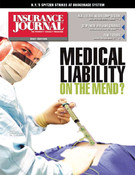Just weeks into his tenure as president and CEO of the Des Plaines, Ill.-based Property Casualty Insurers Association of America, Ernst N. Csiszar sat down with Midwest Managing Editor Kevin O’Reilly during the group’s annual legislative meeting in Chicago. A strong advocate of a competitive and unfettered insurance marketplace, Csiszar was South Carolina’s insurance director for six years and this year served as president of the National Association of Insurance Commissioners. Originally from Romania, Csiszar immigrated to Canada in his teens and went on to a successful career as an investment banker in South Carolina.
The discussion, excerpted below, ran the gamut, but the focus was squarely on the hot issue—regulatory reform.
Insurance Journal: Mr. Csiszar, why did you decide to leave the South Carolina directorship and take this position with PCI?
Ernst Csiszar: I get to continue my work on public policy, actually in a more stable form than I could as commissioner with even a greater degree of permanency in this position. And I have the ability to influence change in the industry, particularly regulatory change, through the position here, because as a commissioner you are at the mercy and will of the governor, or at least I was in my case. All these things I like doing the best. I like my advocacy role, I very much enjoyed my work in Washington and the state legislature and NCOIL and so on fed into a feeling I had that, “Gee, this is something I really want to do.” And those were the circumstances.
IJ: During your tenure in South Carolina you were criticized by some there for being too industry-friendly. I suppose some folks, now that you’re becoming a lobbyist for a leading industry trade group, may feel that critique has now been proven true. How do you respond to that?
Csiszar: Look, I’ve layed a number of roles in my life. I’ve been in different careers and done different things. To make an assessment of how true or untrue that is you have to look at my record. I’d like to think that my record speaks for itself. As a regulator I presented the industry with some tough decisions when they had to be made and at other times I was very sympathetic to the industry. …
Now, those who’ve criticized me, and we know who they are, my view is that they represent a discredited, outdated ideology, an ideology that has been abandoned even in its place of origin, that being the Soviet Union and the Communist bloc. This is socialism. Ultimately, when you control prices, it’s socialism. I am proud of the fact that I am an advocate for a more market-based system. Not because it’s business-friendly, but because it’s friendly for the customers, the consumers.
IJ: At this juncture what is your assessment of the future of state-based regulation?
Csiszar: I am hopeful that the state-based system can reform itself. As you know I have been a consistent advocate of making the changes at the state level. I am not fond of a single federal type of regulator. Having said that I think I need to add a couple of caveats. I think we’re getting to the point where this is the state system’s final chance to reform itself. We’ve talked about uniformity and deregulating rates and changes to the intrusive nature of the regulatory system and we’ve talked about for over a hundred years. And the reality of it is that it hasn’t happened. I am hopeful that with the leverage in terms of federal interest that we are now seeing combined with stock leverage and leverage from organizations like PCI, that the system can reform itself. That’s the first caveat.
The second caveat that I would add to it is that it is not good enough just for the regulators to agree with the reform. My concern, very simply is, from a practical standpoint, we have to look at jumping through several hoops, all in unison, and in all the same way, and all make it if we are to look at a truly thorough and effective state reform. What I mean by that is legislators, governors, regulators and ultimately the bureaucracies in the different departments as well. So there are four hoops to go through, all in the same way, all with uniformity, all with a degree of homogeneity and from a practical standpoint I will admit that there is an element of doubt in my mind as to whether this is achievable or not. But I would like to give it a chance.
IJ: In the NAIC’s statement of intent to modernize, they give a date of 2008. Obviously, Congress is moving faster. Should that date realistically be pushed up?
Csiszar: I think that the three years that you see in the SMART legislation is really the proper timing. Now, given we don’t know where and when that’s going to pass, I don’t think we have five or six years. The reason I say that is because I think we will see first of all more and more of a commercial premium going into the alternative risk market, that’s element number one. And the fact of the matter is over 50 percent of that market has already disappeared. In fact the alternative risk market is now the traditional market. …
If you are going to change the system, do it before a crisis hits. If you do things in a time of crisis, you know what happens to the pendulum. The pendulum swings entirely the other way. We saw it happen with Enron and WorldCom. We ought to be able to do our reform, without having to go through the elements of a crisis. Look at some of the failures we’ve had financially, I mean it has not been a pretty sight the last few years. We’ve had Alliance, Legion, Villanova, Kemper is now in trouble, so I think the time has come to ask, “If this is such a good system, why are these things happening?” And surely the answer has to be that part of this is simply due to the regulatory system.
IJ: With regard to agents and brokers, the Big I obviously has been supportive of a middle-of-the-road approach in terms of not having a direct regulation, but having federal standards. There was a recent survey of members of the National Association of Professional Insurance Agents, and a vast majority of them opposed any federal action and said they were happy with the way their home state regulates insurance. What do you plan to do bring, not just the folks who represent the agents, but the rank-and-file agents along on this issue, to assure them that as you move along that their concern, which is ultimately their clients, that they won’t be left without protections?
Csiszar: Again, I can’t speak for the PIA, and I am certainly not going to speak for the Big I, and I suppose the agents have every right to make their own decision as to what kind of regulatory system they would prefer. I think what we need to convey to the Big I as well as to the PIA is very simply what the benefits of a more standardized, more market-based kind of system are. And, I think by and large we’ve done a decent job in that respect, but there is some work left to be done. Agents are usually very closely tied into their community, very localized and I think to the extent that they can derive benefits from this, it will require a bit more education in some areas. …
The agents’ main concern is the licensing process; that is their bread and butter. If the licensing process can be resolved, preferably through uniformity, I don’t think reciprocity is an option even though the NAIC has seemed to settle on reciprocity at this point, I think the agents would be happy. The reality of it is that if they are looking for uniformity, they are unlikely to get it at the state level as is without some kind of federal intervention. … The SMART legislation calls for the states to work toward uniformity.
IJ: So what are they paying you now?
Csiszar: Oh, they’re paying me nothing. I’m doing this for free.
IJ: Well in that case you should apply for my job. It pays slightly better than that.
Csiszar: I just left a job in South Carolina that paid about that, but we do this for the love of it, come on now.
IJ: I think you may be the first person in government to ever go over to the lobbying side for the love of it. Thank you very much for your time. We really appreciate it.
Csiszar: Thank you.
Was this article valuable?
Here are more articles you may enjoy.


 Married Insurance Brokers Indicted for Allegedly Running $750K Fraud Scheme
Married Insurance Brokers Indicted for Allegedly Running $750K Fraud Scheme  Longtime Alabama Dentist Charged With Insurance Fraud in 2025 Office Explosion
Longtime Alabama Dentist Charged With Insurance Fraud in 2025 Office Explosion  Trapped Tesla Driver’s 911 Call: ‘It’s on Fire. Help Please’
Trapped Tesla Driver’s 911 Call: ‘It’s on Fire. Help Please’  Charges Dropped Against ‘Poster Boy’ Florida Contractor Accused of Insurance Fraud
Charges Dropped Against ‘Poster Boy’ Florida Contractor Accused of Insurance Fraud 


